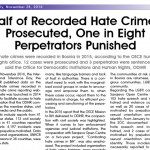
Bosnia Daily, November 28, 2016
PDF version available here.
24 hate crimes were recorded in Bosnia in 2015, according to the OSCE human rights office. 12 cases were prosecuted and 3 perpetrators were sentenced, said the Office for Democratic Institutions and Human Rights, ODIHR
On 16 November 2016, the Inter national Tolerance Day, the ODIHR published data on the number of hate crimes recorded in 2015 on its hate crime reporting website. The website was launched in 2014 with the aim to facilitate access to hate crimes information that the ODIHR compiled. It serves the member states, civil society, the media and the public. The 2015 stats include reports from 41 OSCE member states. 113 civil society organizations in 41 countries reported 5,357 incidents. 4,197 incidents were classified as prejudice-motivated. Data from international organizations, UNHCR and OSCE Missions in 35 countries, were added to the stats.
Reporting Hate Crimes Still Poses Challenge
Many victims do not report hate crimes cases. The reasons for that are many, like language barriers and lack of trust in authorities. There is a constant need to work with the marginalized social groups in order to encourage and empower them to, when these cases occur, report them to the institutions in charge, for efficient processing and sanctioning of the perpetrators. In the 2015 report that the OSCE Mission to BiH delivered to ODIHR, the cooperation with civil society was highlighted. When it comes to law enforcement agencies and judicial institutions, the cooperation with Sarajevo Open Centre on a two-year project, “Combating hate crimes in BiH”, was also emphasized. The project included organization of hate crime trainings, more precisely trainings on prejudice as a motive for crimes. 155 police officers attended the trainings. ODIHR noted that BiH didn’t submit data on prejudice-motivated hate crimes.
The communities at risk of hate crime in Bosnia are returnees, minority religious communities, LGBTI and Roma community. Regarding the LGBTI community, the Sarajevo Open Centre documented 103 hate speech and incitement to hatred and violence cases in 2015, as well as 20 cases of hate crimes motivated by prejudice based on sexual orientation and/or gender identity. From January to March 2016, the SOC documented 23 cases of hate speech and incitement to hatred, and 2 cases of hate crimes motivated by prejudice based on sexual orientation and/or gender identity. Those incidents were not necessarily reported to the authorities, which indicates the still low level of trust in the institutions, and the fact that violence against LGBTI persons is still in the so called “gray” area. A research carried out by the National Democratic Institute in 2015 showed that 15% of LGBT persons in BiH suffered physical violence because of their sexual orientation and/or gender identity, and 72% suffered verbal abuse and harassment. The research did not include intersex persons.
Hate Defined as an Aggravating Circumstance
Hate crimes in the Bosnian criminal legislation are regulated on the level of entities and the Brcko District. The first significant amendments were made in 2010 in the Criminal Codes on the state level, in Brcko District and Republika Srpska entity. In 2013, the regulation was improved in the RS Criminal Code, and finally in the Federation entity in 2016. Hatred (prejudice as the motive) is defined as an aggravating circumstance when sanctioning all crimes that the national Criminal Code regulates. The RS Criminal Code regulates hate crime as an aggravating circumstance. The new amendments to the Federation’s Criminal Code regulated hate crime as an aggravating circumstance